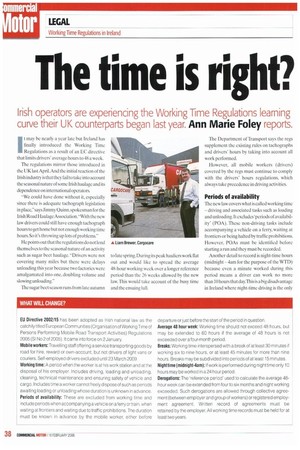WHAT WILL CHANGE?
Page 38

If you've noticed an error in this article please click here to report it so we can fix it.
EU Directive 2002/15 has been adopted as Irish national law as the catchily titled European Communities (Organisation of Working Timed Persons Performing Mobile Road Transport Activities) Regulations 2005 (SI No 2 of 2005). It came into force on 2 January.
Mobile workers: Travelling staff offering a service transporting goods by road for hire, reward or own-account, but not drivers of light vans or couriers. Self-employed drivers excluded until 23 March 2009.
Working time: A period when the worker is at his work station and at the disposal of his employer. Includes driving, loading and unloading, cleaning, technical maintenance and ensuring safety of vehicle and cargo. Includes time a worker cannot freely dispose of such as periods awaiting loading or unloading whose duration is unknown in advance. Periods of availability: These are excluded from working time and include periods when accompanying a vehicle on a ferry or train, when waiting at frontiers and waiting due to traffic prohibitions, The duration must be known in advance by the mobile worker, either before departure or just before the start of the period in question.
Average 48 hour week: Working time should not exceed 48 hours, but may be extended to 60 hours if the average of 48 hours is not exceeded over a four-month period.
Breaks: Working time interspersed with a break of at least 30 minutes if working six to nine hours, or at least 45 minutes for more than nine hours, Breaks may be subdivided into periods of at least 15 minutes. Nighttime (midnight-4am): If work is performed during night time only 10 hours may be worked in a 24 hour period.
Derogations: The 'reference period' used to calculate the average 48hour week can be extended from four to six months and night working exceeded. Such derogations are allowed through collective agreement (between employer and group of workers) or registered employment agreement. Written record of agreements must be retained by the employer. All working time records must be held for at least two years.






































































































































































































